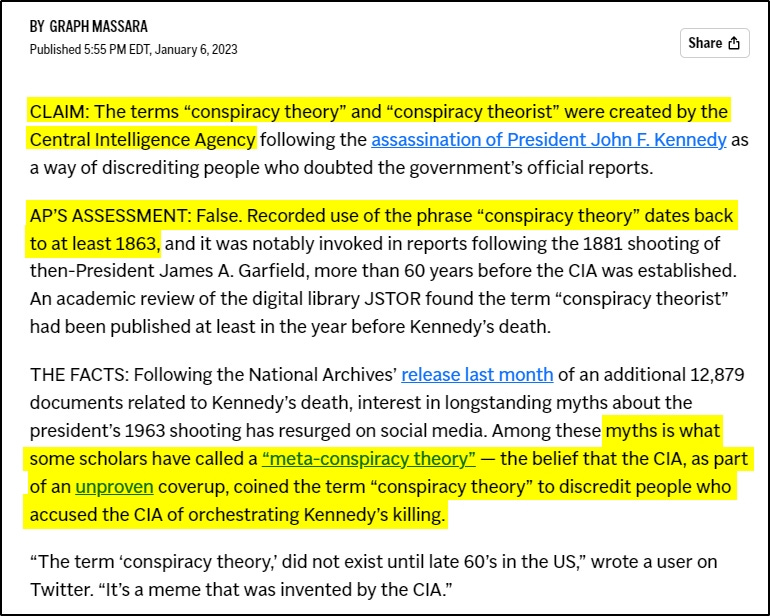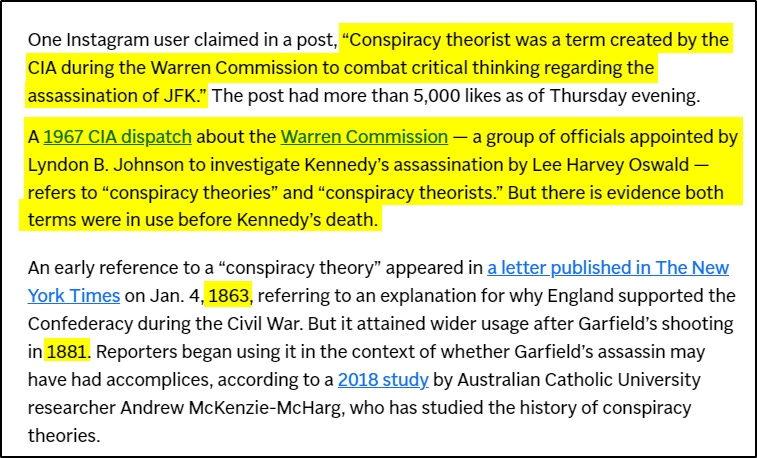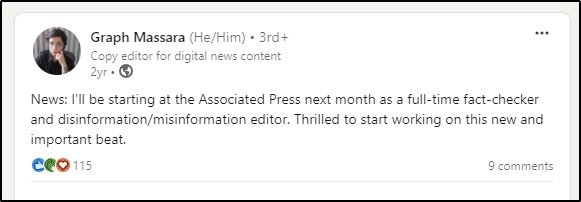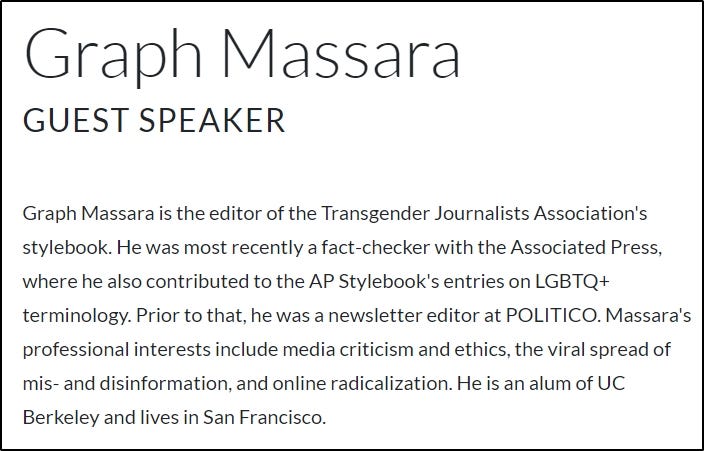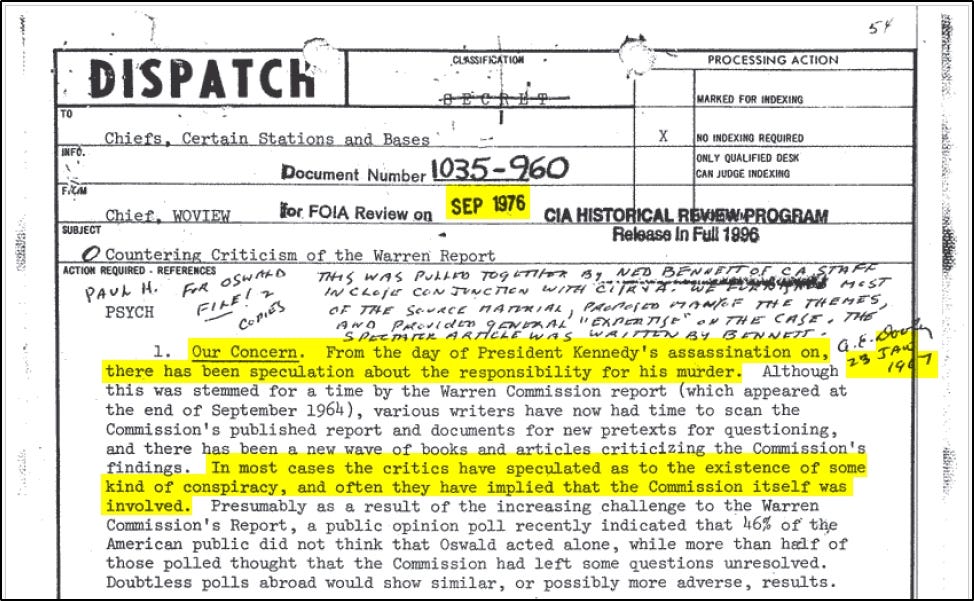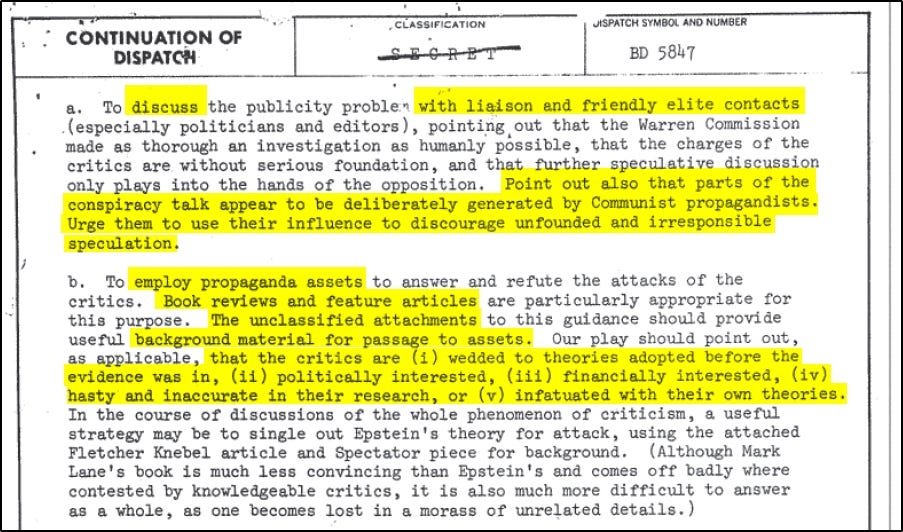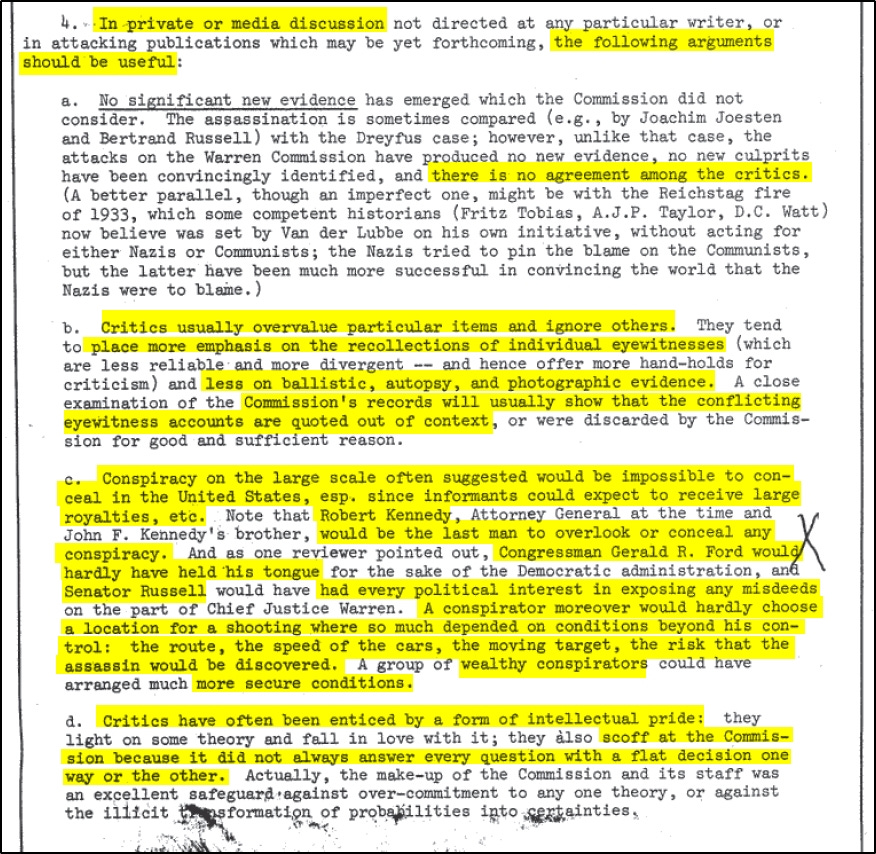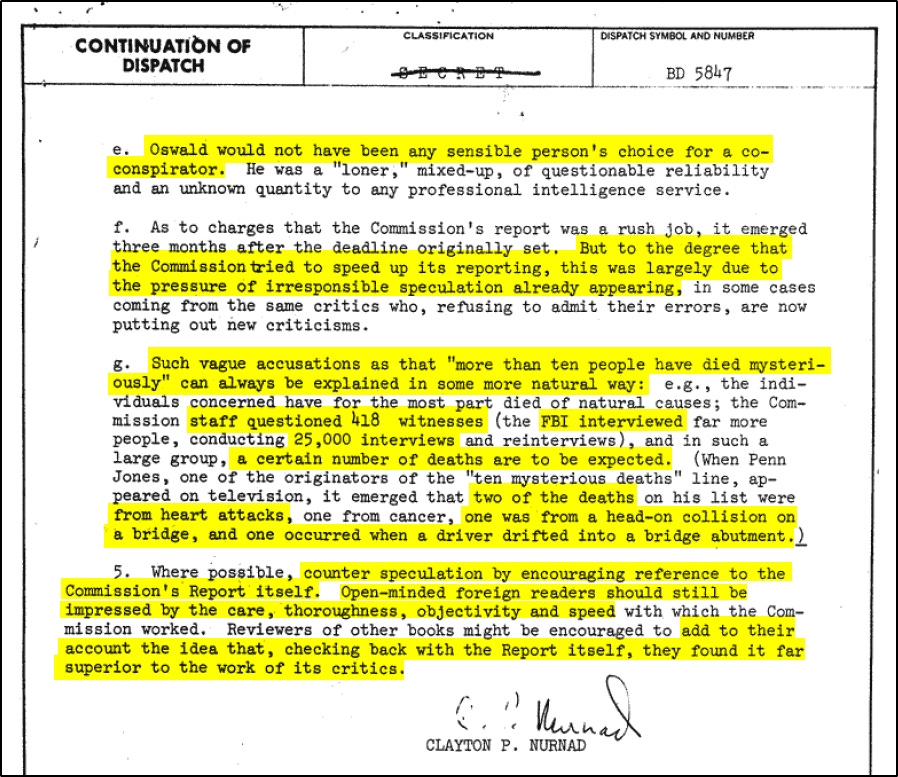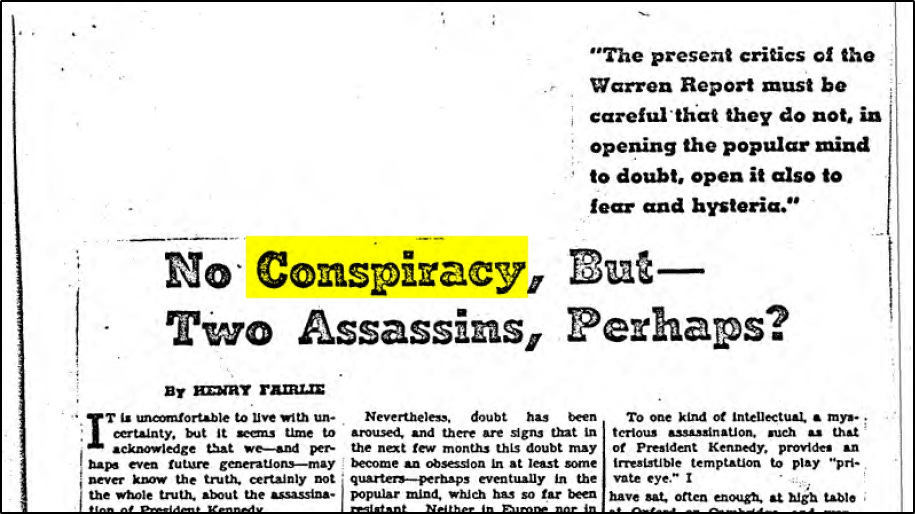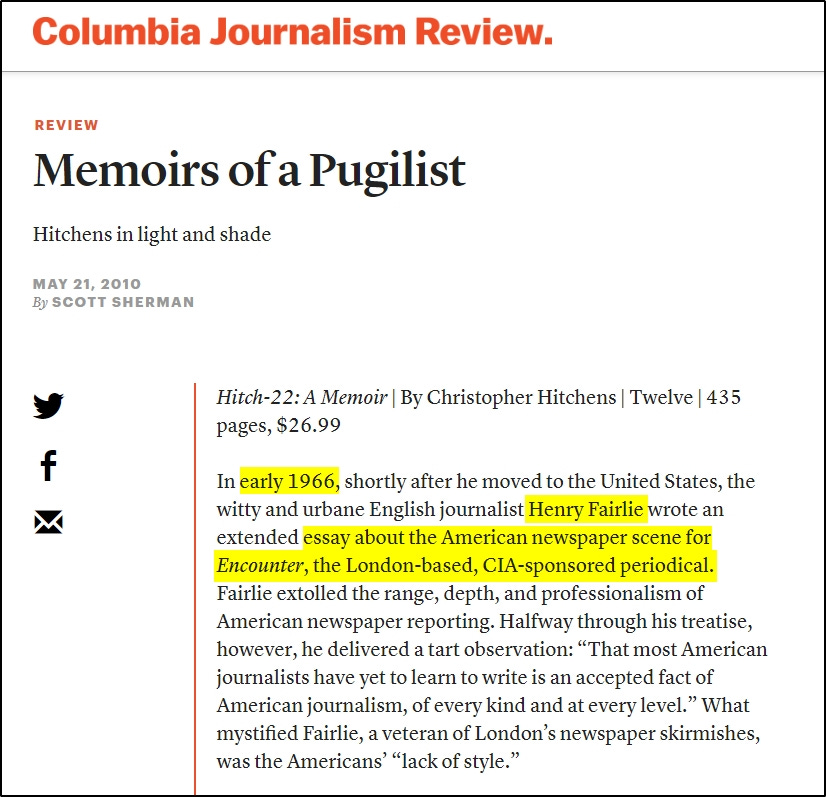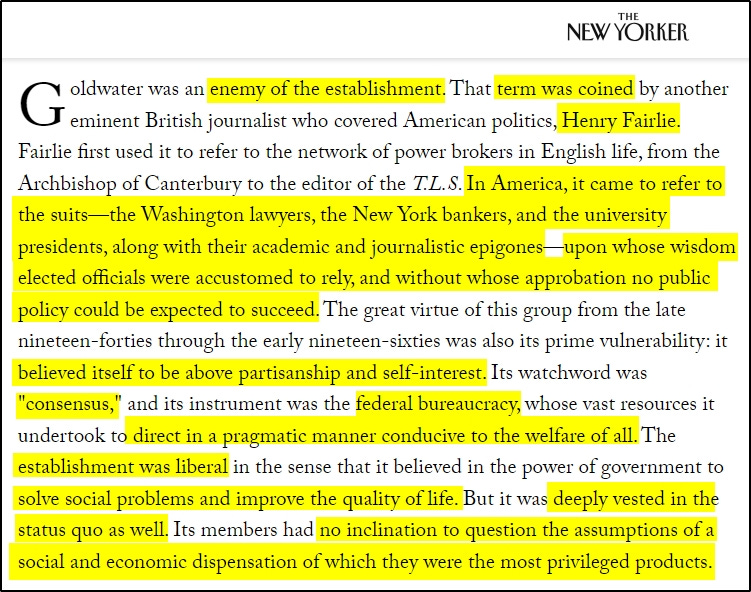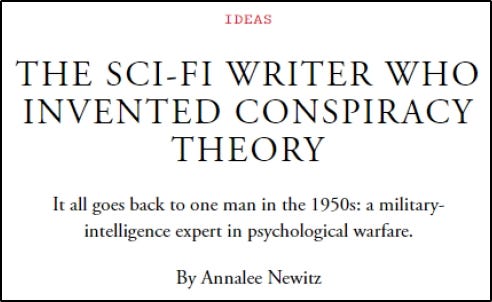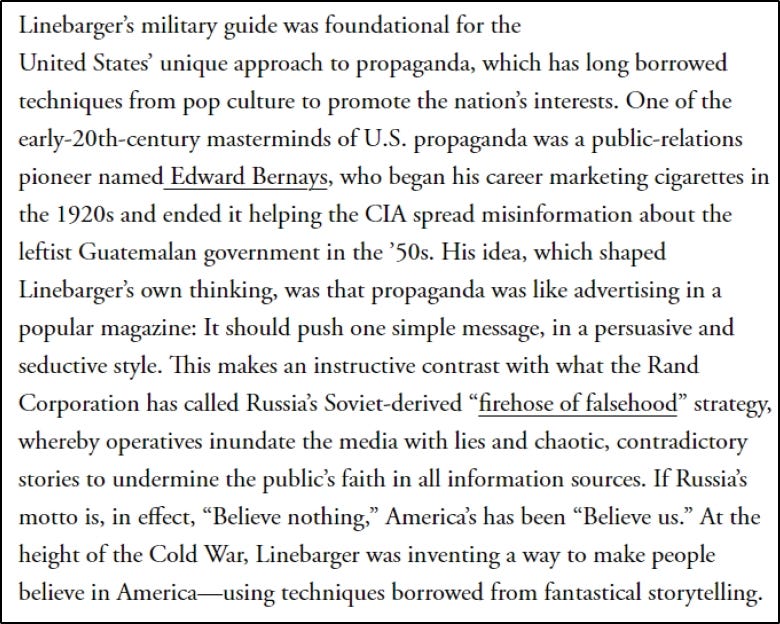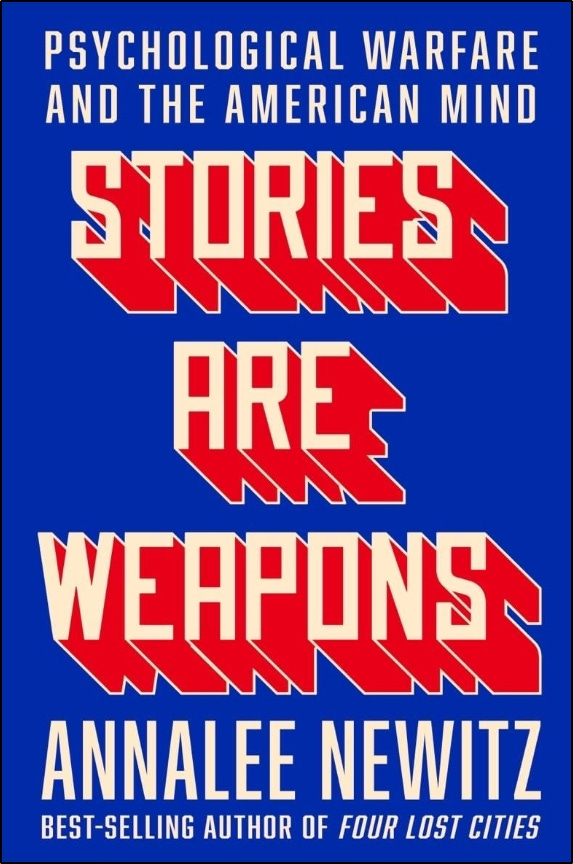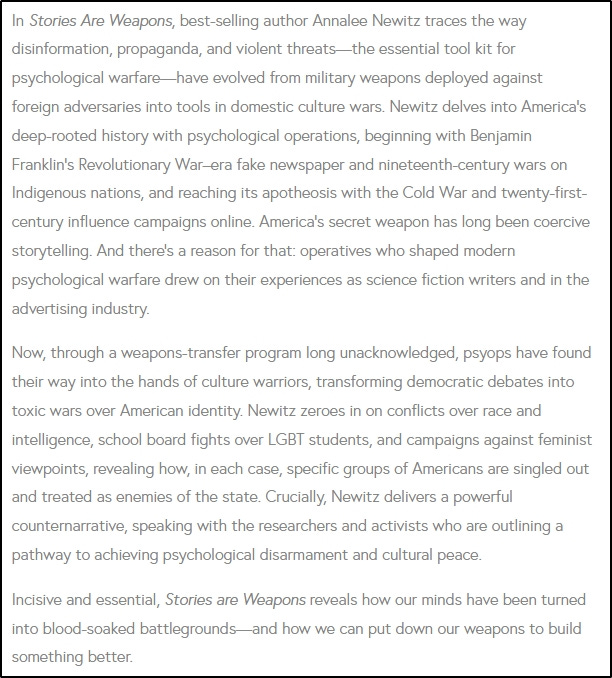The conspiracy around the conspiracy around the CIA inventing the term 'conspiracy theory'
They may not have been the first to link the words - but they did so much more.
Have you heard “the CIA invented ‘conspiracy theorist’ to discredit anyone who questions the government”? Or some version of that?
Maybe a Google search investigating that specific sentence brought you here! But probably not…
This case is a wonderful illustration of so many points/counterpoints, logical fallacies, dogma, heuristics, distrust, manipulation, buzzwords…you know. The fun stuff.
Let’s actually do the Google search ourselves:
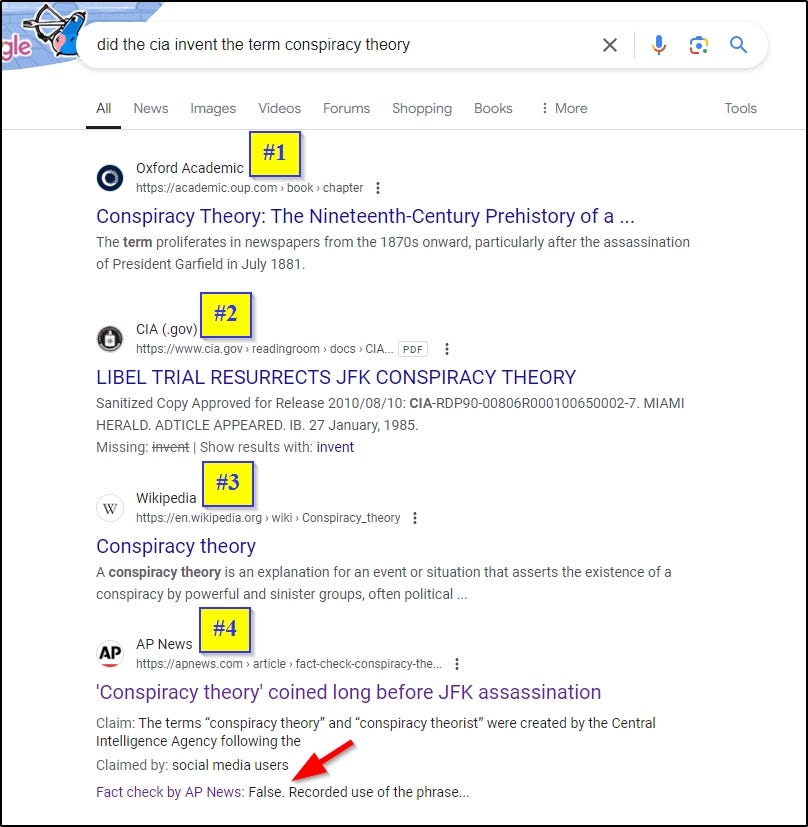
It’s (hopefully) widely known, now, that Google has algorithms running behind the scenes influencing these results, and the algorithms are updated regularly. I would consider these top 4 hits the “mainstream, algorithm-influenced” results, as this search was performed on a Windows PC, on regular Chrome, without a VPN or any other “trick”. The algorithm influence is seen with the CIA.gov result, as my personal browser history will show frequent visits to the CIA FOIA Reading Room.
So, let’s do the same search, but we’ll do it running a VPN service using a Brave browser that has never been logged into any Google-connected accounts:
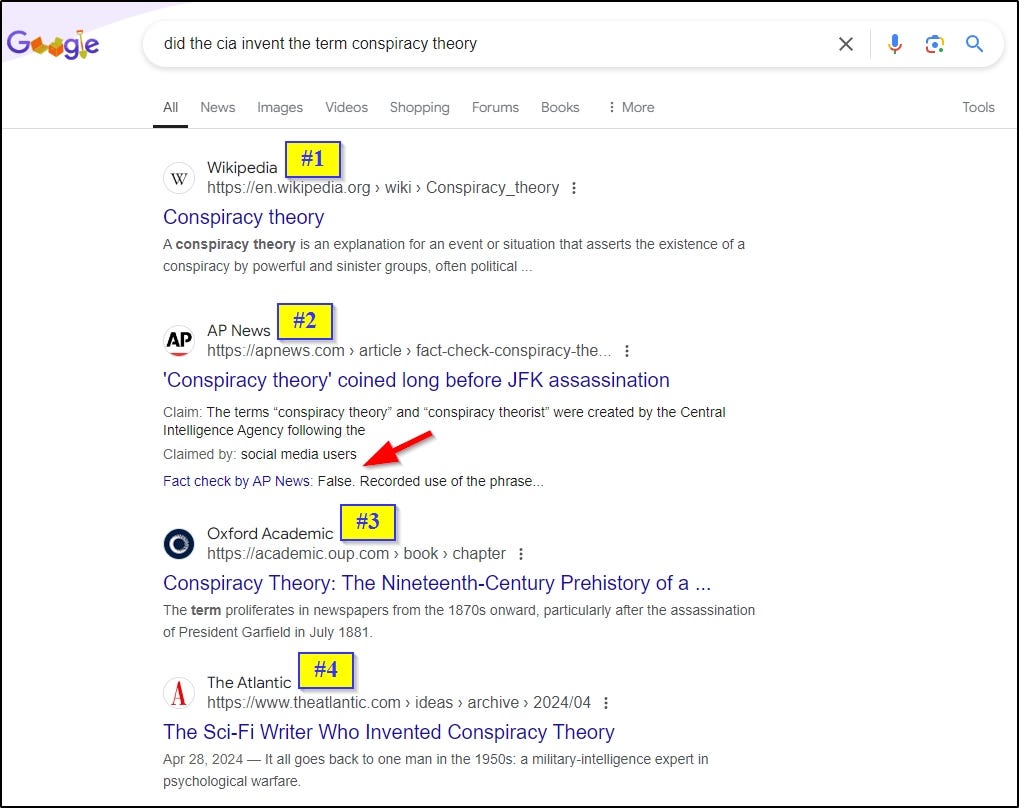
I don’t know if there’s anyone left on Earth, by the way, who doesn’t know/believe that Google search results are heavily influenced based on the person, but this is an easy experiment for anyone to run themselves if you still have doubts.
It’s interesting that, for me personally, Google “allows” the CIA files to show up so early. I suspect it’s because the algorithm knows that it’s a US Government website, and it weighs that heavily, regardless of which .Gov website it actually is, and the content it’s showing me.
The second search is what I would consider a default/mainstream result. By using a VPN and a different browser (specifically Brave, which allegedly has better security than Chrome), I’ve lightly obfuscated my personal history/habits through both IP address and cookies (and whatever else is low-hanging material).
It’s worth noting that I harbor no delusions about my anonymity with these methods - and you shouldn’t, either. It’s better than nothing, but my “digital exhaust” is still trackable - easily - by other means. Most likely the smartphone in my pocket. But I digress.
Why does this matter?
So let’s say you’re a totally average, vanilla, normal person. You’re fairly disconnected to anything outside the mainstream, and don’t focus much on politics, science, controversial issues, etc. One of your buddies told you “the CIA invented the term conspiracy theory” the other day.
Most average/normal people will ignore or forget that claim as soon as the conversation ends - likely, thinking it’s just their kooky buddy saying kooky stuff again.
A small percentage will believe this statement without fact checking (or have already heard and believed it).
However, some segment of normal people will hear this and think “hmm…that’s something which could be true, but I can’t take some random person’s word for it, I need to check this out”.
This is what I would consider “responsible skepticism and discourse”. We should be cautious to dismiss plausible information immediately simply because of the source or the claim. Simultaneously, there has to be some level of trust in people and institutions, otherwise there could be no society/civilization.
If I recall, the first time I heard this claim, my thought process was “the CIA is at the core of the JFK conspiracy concerns, they’ve engaged in counterintelligence since the beginning, this is feasible but I bet the term has been around a lot longer, I would guess this is something someone said once in that Oliver Stone JFK movie that got integrated into pop culture, I think it’s probably not true but I’ll just double-check because that would be interesting if it was true”.
Honestly, I think I most of my suspicion that the claim was false centered on my disbelief that it took till the 1960s for someone to come up with the term “conspiracy theory” or “conspiracy theorist”.
So, I did what most people would do: a Google search.
Now, the advantage I have today compared to a decade ago is that I KNOW the search results will be biased. Google is my first stop - but it’s not my last. It helps me understand the attack surface of a topic, but I would NEVER risk anything of value based on the first page of a Google search.
While I don’t remember specifically when I first went down this rabbit hole (at least one or two years ago), I do remember the results being similar to what we see today.
Knowing how my brain works, I probably clicked the AP News link first because it boldly declares “FALSE” on the literal search page. Don’t even need to read the article! Fake news! Those damn kooky conspiracy theorists failed again.
That’s always a warning sign. If you search for something that could be even a little controversial, and your question is more or less answered on the first page of the search results in the site description: you need to dig deeper.
Let’s see why AP News says it’s “false”
The article opens with:
In the most concrete and literal interpretation, this article states that no, the CIA did not “create the term conspiracy theory”.
But language holds nuance. After all, the entire legal profession is built by people making careers out of arguing “the letter versus the spirit of the law”.
The spirit of the claim is that the CIA weaponized stigma against anyone who expressed disbelief in the “mainstream narrative”. Even though the AP article made sure the claim of “FALSE” was the first thing you see, perhaps they allow for a more reasonable discussion in the rest of the piece?
Let’s see:
Oh! It’s so close. This is both blunt and masterful - depending on if it was written with intent or accidently.
This mysterious Instagram user is almost correct. The CIA didn’t create the term, and the memo was written after the Warren Commission published their report, not during.
The 1967 CIA memo was, however, aimed at combating critical thinking around the JFK assassination.
It’s more sinister than simply “inventing” a term. The 1967 memo is actually a playbook for shutting down anyone questioning the official narrative of the JFK assassination. In particular, it details how to address theories that there was a CIA conspiracy behind the assassination.
It also reflects how narratives or beliefs “they” didn’t like would be handled moving forward.
Why would AP News acknowledge the memo but not discuss it further?
Reading the AP article, it’s easy to forget that the words had to be crafted somehow, somewhere, by someone. But these days, “someone” can mean a person, people, or AI.
So, if you have the time and inclination, researching the author(s) of any claim-making article can be illuminating. Sometimes you find nothing, but more often than not, it will provide context as to what bias someone may or may not have in their writing.
Who is Graph Massara?
Well that’s interesting. The AP has a “disinformation/misinformation editor”? Since disinfo/misinfo is, by definition, hard to parse (and can be subjective), I would assume you’d have, perhaps, a grizzled, mid-to-late career person with a military/intelligence background…right? This Graph Massara though…they look young. Let’s check a different site:
Interesting. AP News had, at one time, decided it was a good idea to employ someone in their late 20s/early 30s with zero relevant background as their misinfo/disinfo editor?
While I don’t know this person, it’s not difficult to guess how they view the world and how it will influence their opinions and writing. In this case, it wasn’t necessary to engage in any additional research into the author to know the article had a bias. However, in other cases, taking the extra step of looking up the author can help you form your own opinion (and…you find a lot of obvious bots or professional disinfo agents).
Show me this 1967 memo already!
Obtained and released in 1977 by the New York Times, here’s one of my favorite documents ever written. It opens with:
Based on the margin notes, it was written around January 23rd, 1967, to help counter the critics “speculating” that they were involved in “some kind of conspiracy”.
While it does not “invent” the infamous “conspiracy theorist” insult, it does, in fact, do something far more impactful. The memo is the birth of the government’s method for combating all alternative explanations through to the present day with what I call the “The 67 Strategy”:
67 Strategy Rule #1: “If the teacher forgets to assign homework, don’t raise your hand”.
In other words - don’t be the reason any alternative theory gets talked about. Let it fade away when you can (“memory hole”).
67 Strategy Rule #2: “Inception”.
Build consensus through a whisper campaign with powerful and influential people. Let ideas and opinions percolate in communities in an apparent “grassroots” manner rather than broadcast your propaganda message.
67 Strategy Rule #3: “Ad hominem to ostracize”.
One of the most (if not the most) important human society filters is “us versus them”. If a person - and their opinion - is viewed as a “them”, as an outgroup: they are more easily dismissed. So, create ad hominem-attacking content (ideally in publications and platforms with institutional authority) and paint the opposition as:
Refusing to give up favorite theories despite evidence
Having formed theories based on partisanship, not evidence
Holding theories that benefit them financially, regardless of evidence
Are too dumb to “correctly” interpret available evidence
In love with their stupid theories no matter the evidence
67 Strategy Rule #4: “Conflate consensus with truth”.
Spin disagreement among critics as evidence of “being wrong”. After all, everything that’s true will always have consensus, right?
67 Strategy Rule #5: “Your so-called evidence”.
Contrary to popular belief, most theories that run counter to the official narrative don’t appear out of nowhere. There’s usually something in “the story” that doesn’t quite fit what the establishment says is “the truth”.
Quite often, non-government entities have zero access to “hard data”. What do you think would happen if, at a crime scene, a citizen decided to take a bullet home to analyze it themselves? Hint: don’t even think about trying it.
So “eyewitness accounts”, photos, and videos are often the basis for alternative theories. Despite their daily, frequent use in court cases across the country - eyewitnesses only tell the truth when their accounts line up with the official story. If they conflict with the official story…they’re hot garbage.
67 Strategy Rule #6: “Disbelief through scale”.
This is one of my favorites, and clearly one of their favorites as well. Refute alternative theories by stating there’s no way a conspiracy “this big” could be kept secret for “this long”.
The JFK assassination is a great example. The logical fallacy here is that, if there was a conspiracy inside the government to assassinate him, then literally everyone would be involved.
This is, of course, ridiculous. Countless crimes happen inside large organizations each and every day with only a handful of people engaged in those crimes. If two accountants at McDonald’s Headquarters figure out a way to embezzle money from McDonald’s…would we claim that everyone working at McDonald’s Headquarters is involved? No, of course not. We recognize that small groups of people within larger entities can operate independently…except when someone is trying to dismiss a “conspiracy theory”.
67 Strategy Rule #7: “It’s really ego”.
This is another ad hominem. Rather than directly addressing the alternative theory on its merit (or lack thereof), claim that the only reason this theory exists is because the person pushing it thinks they’re so smart.
67 Strategy Rule #8: “The patsy is a patsy”.
Your alternative theory can’t be true, because [what we’ve allowed you to know about person or entity XYZ] means they’re totally incompetent! No way they could do something like this!
This is an interesting version of a strawman - it creates a strawman not from an abstraction of the argument, but from the man (or woman, or entity, etc) itself.
The JFK assassination is a good example…it’s likely Oswald was much more complex and capable than the original official narrative made him out to be.
67 Strategy Rule #9: “Any flaws are your fault”.
We think the official narrative is perfect, and amazing, and comprehensive. However, hypothetically, even if we were incomplete, or could have investigated something better, or anything like that - you didn’t let us! You jackals just wouldn’t let us work in peace, so while the thing we released was perfect, if you weren’t literal devils…it could have been even more perfect! Shame on you.
67 Strategy Rule #10: “You obviously don’t understand statistics”.
What a classic move. This technique is not limited to arguing against alternative theories, it’s a cornerstone of all academia and used by all of us against each other. There’s always some confounders, or “regression to the mean”, or “p-hacking”, or one of a million reasons to claim that “the other guys’ numbers are wrong, but my numbers are right”.
Also, specific to this memo: it’s hilarious the examples they use to support their claim that “actually, these so-called suspicious deaths were not suspicious at all!”
Because there’s certainly no drug/poison that could cause a heart attack, and…*checks notes*…death by motor vehicle accident is never murder…right?
67 Strategy Rule #11: “Blind them with authority bullshit”.
This final one is just incredible. It literally says “point skeptics towards the official narrative, we know they won’t read it, you know they won’t read it, but they’ll look at how big and well-built the official narrative is, and they’ll think wow, look at how big this is, I guess it must be true”.
Sometimes, presentation really is everything. Who are you going to believe, a couple of scruffy nobodies who have a compelling theory and data to back it up, or the United States Government, wearing military dress uniforms, working in imposing buildings, pointing at an actual published tome that men in suits wrote and the President himself endorses?
“Appeal to authority” works for a reason.
What could be contributing to the literal version of this myth?
The official “CIA Reading Room” PDF file which contains this memo actually contains much more. It appears to be the background research used to author the memo, or perhaps material meant to accompany the memo when folks within the CIA received it - I’m not sure.
Regardless, this article from a journalist named Henry Fairlie was included:
The word “conspiracy” shows up in this article ~19 times. Nineteen! It’s really not hard to imagine how the “myth” of the CIA inventing “conspiracy theory” got started.
When I was researching this myself, it appears that this “Henry Fairlie” character was probably, at the least, “friendly” to CIA interests:
Here’s an interesting tidbit from a New Yorker article:
It’s extremely interesting to see Fairlie show up in this CIA memo file with an article he wrote at the time using the word “conspiracy” 19 times, learn that he wrote pieces for “CIA-sponsored” publications, and evidently invented the term “enemy of the establishment”.
This deserves its own exploration at a different time. For now, I’ll just note that I find these coincidences…interesting.
Well…let’s see what this Atlantic article is about
To close, let’s take a look at some of the content from Search Result #4 (for computers/people with neutral algorithms), authored by Annalee Newitz.
Ah. Interesting. The “establishment” doesn’t like reducing the origin of the stigmatized “conspiracy theory” being linked to the CIA and the JFK assassination, but they’ll publish work ascribing source credit to…psyops from a fiction writer?
Let’s read a bit:
There’s just…so many assumptions here. The most salient being: are we sure America would never deploy the “firehose of falsehood” strategy?
But, again, exploring this article is for a different time.
To keep it brief, as before, let’s search the author of this Atlantic content and see if it helps inform us on the nature and character of her bias.
Oh, neat! She has a new book:
Let’s look at the description:
This is the apex of “institutionalized thought”, the box of “creativity” that anyone who aspires to have a career within traditional academia, journalism, or media must ensure their work falls within.
The examples of “psyops” used by “culture warriors” clearly skew in a certain ideological direction.
The author is a meta-weapon of the psywar. No secretive government agency or cabal needed to ask her to write the article on conspiracy theories or this book.
She is the product of the system that was set into motion so long ago that she imagines herself as an outside observer, rather than the finished product.
Now, as a disclaimer, I have not read the book (and I likely won’t). It’s entirely possible she recognizes this and has a passage (or chapter) dedicated to introspective musings.
I doubt it, of course.
FACT CHECK: DID THE CIA INVENT CONSPIRACY THEORIES?
They weren’t the first to put those two words together, no. But they sure as hell were the engine powering an entire culture’s attitude towards anyone questioning “the official narrative”.
The CIA didn’t invent the term, but they infused the term with life, akin to Frankenstein’s monster.




